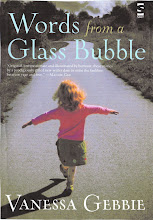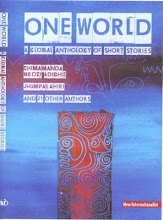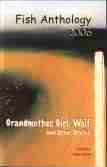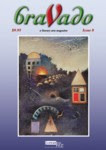 Nuala ni Chonchir's website is HERE. And, she blogs HERE.
Nuala ni Chonchir's website is HERE. And, she blogs HERE.
VANESSA: Nuala - We're both short storyists - you are also an acclaimed and award-winning poet. Aagh. Hang on while I try to say summat reasonable.
I loved Portrait of the Artist with a Red Car. Why? I love that it is not coy, this stuff you do, these scenes you paint with your words, these thoughts you make come real and alive in my head. Without knowing the ‘how’. While being wrong-footed and delighted by the turns in the path along the way.
I love the way your words are beautiful but solid as well. How they stand there, like a toddler on braced legs, looking back at me unflinching and saying ‘You take me as I am or not at all.’
I love the sense I get when I read these poems, that I am intruding into the poet’s space, half-invited. It makes my senses prickle, as though I was creeping through your house at night trying not to be heard.
NUALA:Thanks, Vanessa. I think that’s a very vivid and insightful description of what poetry can do to a reader. My poetry comes from a hugely personal place, especially in the last few years when I have been on somewhat of a personal rollercoaster. I have found writing about it all (marriage breakdown, new love, fertility issues) has helped me cope in some way. Writing is woven into my life as much as my children are. It is just ever-present.
VANESSA:‘Body Gifts’ for example, each couplet beginning ‘I give you’. Less than 50 words, it is a small and perfect hymn to lovemaking and I love it! It is playful, as well, talking of
lip-flesh
made plump as twin seals.
And another hymn (you’ll have to excuse me, N – it’s just how I feel the words?) – ‘Aubade to an Extraordinary Life’ – a poem that begins
In the afterglow, I watch your bear-like doze
and weaves round to,
…the ordinary sharing and partings of life:
a dinner made together, lunches packed in schoolbags,
bedtime stories read, the call of Monday morning
that sees you bound for the train, me to my desk.
NUALA:I enjoy writing love poems – I like when they occur to me. The aubade form is usually about lovers parting at dawn and it struck me that my partner and I always separate in the wee small hours as he works nearly a hundred miles away. So I thought I’d try an aubade and make it positive. I don’t use forms much but sometimes they are fun to try.
VANESSA: Patrick Cotter, whose own work is fiercely honest and raw sometimes, I think, endorses this collection by saying ‘there is not only music in Ní Chonchúir’s words, there is dancing too. (…) But beneath the surface there is also substance as (she) explores the closest relationships with an honesty so raw it scratches.’
Maybe it is because I come at the words as a woman, I don’t find your words ‘scratch’. They burn, sometimes, but not scratch.
NUALA:He actually said ‘scorches’, so that matches what you felt. (Memo to self: buy new reading specs…V)
Patrick is a great poet and it is pleasing to have such positive words from him. I admire his sensual, sparky poetry very much. While I don’t think he’d call himself a feminist, he is one of those male poets who actually likes women and celebrates them. We are lucky in Ireland that we have a few of them!
VANESSA: As the mother of sons, the final stanza of ‘Other People’s Children’ comes back at me again and again for example, because you are saying this for me, and it brings tears even typing this:
And, I know, I will fail my sons somehow,
maybe all-how, but still I try
- try my flawed best –
or somewhere near to it at least.
NUALA: I re-read that poem today in preparation for a reading this Friday and it resonated with me too. I sometimes feel like a disaster as a mother (much too focussed on my need to write) but I guess I am better than some, not as good as others. Being a writer and a mother (especially when they are young and you live outside your home area) throws up a particular set of difficulties. You are always torn between scrabbling round on the floor/giving them time, or sneaking off to write and dream and read when you can. It’s an extremely hard balancing act and I’m struggling with it a lot just now.
VANESSA: And I love, and am happily jealous of, your ability to take the ‘ordinary’ that is never that – and paint it so it turns ordinariness on its head,
…still my baby labours in me,
adding lanugo and vernix
to her cornucopia of miracles,
I’m bowing down here to a poet who can make those words echo. Lanugo? Vernix? Come on! But you do, and I look again, and see it for what it is. Anything but ordinary – see? And extraordinarily beautiful.
NUALA: Thank you, Vanessa. I know what you mean. I love to read a poem with the words ‘Motorway’ or ‘tractor’ in them – seemingly unpoetic words – and find that they work well. Feck poetic words – poetry is in and about everything.
VANESSA: ‘Dancing with Paul Durcan’ made me laugh out loud at the beginning – it is like a game of Consequences. Having been at one of his readings, been totally seduced, and bought three books no less – yes, his poetry is ‘filthy with longing’. And you continue the conceit of this into ‘Dream after a Reading’ – underscoring both the metaphor as well as the very real sexual power of some writing.

NUALA: I’m a big Durcan fan – I admire and fear him, in a way; I’m always cowed by immense talent and he has a particular presence in person. The poem is a bit of imagined whimsy – I’ve never actually danced through a bookshop with Paul. Maybe one day!
VANESSA: I hope some records the moment for posterity... the bits that can be recorded, I mean...!
It’s hard to say which poem is my favourite. But after a lot of thinking, it has to actually be one that leaves these themes behind. That seems to me to be a loner here, or maybe it is just that it speaks to me in a different voice? The marvellous poem that begins with an image, an artist - Max Ernst - seeing things including the ‘menacing nightingale’ in a knot of wood. And finishes with the parent holding back truth from a frightened child, because
…I don’t dare to tell him that airplanes do fall,
that people condemn, and that there is menace in more
than paintings of children threatened by a nightingale.
NUALA: I’m glad you like that one, Vanessa. It’s one of those poems that started out in one place and ended up someplace else. It maybe follows Robert Frost’s idea that “like a piece of ice on a hot stove the poem must ride on its own melting.”
VANESSA: What a brilliant quote to finish up on. Thank you for writing these poems, Nuala. My life is richer for them.
NUALA: And thank you, Vanessa for being such an involved reader of them. It was lovely to hear your thoughts.
Nuala's collection is special. It won the Templar Poetry prize in 2009, and can be bought, among others, from the publisher HERE.
Templar Poetry is running their competition for short collections again in 2010. Details are HERE on their website.




.JPG)























3 comments:
Compelling, and leaves the reader wanting to know, learn and read more. Much more! Thanks to you both, V & Nuala, from another Paul Durcan fan.
Thanks, Mynne. I am sooo bamboozled where poetry is concerned. I want to find out, but am soo put off by some of the hoops you seem to have to jump through.
Hi Vanessa,
I felt this interview read like two friends chatting and I was sitting close by earwigging!
It’s wonderful to see how close you as the interviewer read the book, if I hadn’t already ready got it you’d have inspired me to run off and get a copy.
I love Nuala’s brutal honesty both in her poetry and this interview.
Thank you both for sharing with us.
Post a Comment